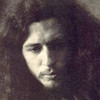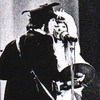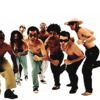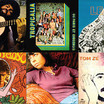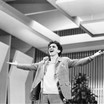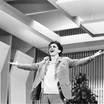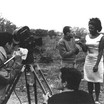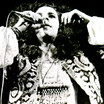Ilumencarnados seres
Três trópicos da tropicália
stones, beatles e dylan
Bob Dylan was not a commercial phenomenon like the Beatles, but in Brazil he was better known than the Rolling Stones. The Stones could have their “satisfaction” on the hit parades, but Dy1an had his cult of admires long before. I remember listening to an one of his records at Toquinho’s house, around the time when he, Chico, and I used to hang out together in São Paulo, before I moved there. Toquinho wanted to know what I thought because It seemed to him insufferably boring – as I remember his emphasizing – to hear a record with all the songs sung and played in the same tone. To me it was interesting, that nasal voice and his coarse way of playing guitar and harmonica. But 1 found the lyrics incomprehensible and ended up bored as well. Once tropicalismo was established, though, I would listen over and over to his marvelous Bringing It All Back Home. To this day, this is the record of Dylan’s that I find most moving. I still barely understood the lyrics, but the atmosphere, the voice, that studied carelessness, the general tone of his work were an inexhaustible source of interest to me. What made the greatest impression was the richness of texture, a sophistication attained with no apparent effort, In contrast to the Beatles. But I cannot say that I preferred Dylan to the Beatles, who compared with the wordness of Dylan’s torrential songs, the rhetoric I could make out from what was intelligible in his lyrics (with my high school English) seemed more constructive and lean. The overt experimentalist of Sgt. Pepper’s Lonely Hearts Club Band was closer not only to what we were doing, but also to the artists I admired, whether Godard, Oswald, Augusto de Campos, João Cabral de Melo Neto, James Joyce, Lewis /carrol, or e. e. cummings. Though the Beatles were obviously more naïve in contrast Dylan seemed yoked to a romantic conception of the poer, without (explicit) incursious into meta language, atonality, or concretism. Yet to this day I study Dylan’s density. I now pay him more attention than I do to the Beatles – and I get more out of it. He is at once a central and a peripheral figure in the panorama of the sixties. At the moment when the British from their side of the Atlantic controlled the game with their version of rock, on this side Dylan was quickening the fountain from which the Beatles and the Rolling Stones ha drunk, showing us where the source was and whence the energy pours out.
Mais:
- » become a tropicalist
- » concretes
- » glauber rocha’s new cinema
- » goals of the movement
- » modernisms of 22
- » nara’s lindonéia
- » origins
- » talking to zé celso
- » the creative energies
- » the mpb on tv
- » the name
- » the night of “alegria, alegria”
- » baby
- » black music
- » caymmi
- » janis
- » joão gilberto
- » música popular nos anos 60
- » oswald no oficina
- » stones, beatles e dylan
- » terra em transe






